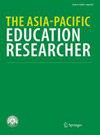Domain-Specific L2 Grit, Anxiety, Boredom, and Enjoyment in Online Chinese Learning
IF 4.6
3区 教育学
Q1 EDUCATION & EDUCATIONAL RESEARCH
引用次数: 0
Abstract
Abstract The shift to emergency remote teaching due to COVID-19 brought diverse psychological, emotional, and academic challenges for second language (L2) learners. Overcoming these challenges necessitated the utilization of grit, a personality trait signifying perseverance and passion to sustain academic progress. While grit and emotions have been explored in English language learning, their interaction remains underexplored in other languages. Despite Mandarin Chinese being widely learned globally, little previous work has been done to investigate learners’ psychological experiences, the function of L2 grit, and the relationshi p between them in online learning from the perspective of positive psychology. This might lead to an incomplete understanding of this pattern across domains and contexts, thus impeding the development of this discipline. This study uses a structural equation model to analyze the relationship between L2 grit, anxiety, boredom, and enjoyment based on 204 valid responses from Chinese as a Second Language learners in mainland China. Results underscore the importance of one facet of L2 grit, perseverance of effort in online Chinese language learning, and highlight the domain-specific nature of emotions. It also suggests that educators need not be overly concerned about negative emotions in online education, as they can be overridden by positive emotions.在线汉语学习中的第二语言磨砺、焦虑、厌倦和享受
由于新冠肺炎疫情,紧急远程教学的转变给第二语言学习者带来了各种心理、情感和学术挑战。克服这些挑战需要运用毅力,这是一种象征毅力和激情的人格特质,以维持学业进步。虽然勇气和情绪在英语学习中得到了探索,但它们在其他语言中的相互作用仍未得到充分探索。尽管普通话在全球范围内被广泛学习,但从积极心理学的角度研究在线学习中学习者的心理体验、第二语言砂砾的功能及其相互关系的研究很少。这可能导致对跨领域和上下文的模式的不完全理解,从而阻碍了该规程的发展。本研究基于204份来自中国大陆地区的汉语作为第二语言学习者的有效反馈,采用结构方程模型分析了第二语言砂砾、焦虑、无聊和享受之间的关系。结果强调了第二语言毅力的一个方面的重要性,即在在线汉语学习中坚持不懈的努力,并强调了情感的特定领域性质。研究还表明,教育工作者不必过分担心在线教育中的负面情绪,因为它们可以被积极情绪所覆盖。
本文章由计算机程序翻译,如有差异,请以英文原文为准。
求助全文
约1分钟内获得全文
求助全文
来源期刊

Asia-Pacific Education Researcher
EDUCATION & EDUCATIONAL RESEARCH-
CiteScore
7.70
自引率
3.00%
发文量
58
期刊介绍:
Founded by the Academic Publications Office, De La Salle University, Manila, PhillippinesTHE ASIA-PACIFIC EDUCATION RESEARCHER (TAPER) is an international refereed journal of original research in education. It provides a venue for the publication of empirical and theoretical studies in education, with emphasis on the experiences of successful educational systems in the Asia-Pacific Region and of the national educational systems therein that are presently underrepresented in the research literature. The journal publishes:• Regular Article that report original research work that leads to the understanding and/or improvement of educational processes and outcomes using research methods and analytic frameworks of the varied academic disciplines (anthropology, applied linguistics, cognitive science, economics, history, philosophy, political science, psychology, sociology, among others) and also using multidisciplinary and interdisciplinary approaches;and Special issue articles whose description will be provided on Call for Papers of each special issue.Regular Article shall contain maximum 6000 words.
 求助内容:
求助内容: 应助结果提醒方式:
应助结果提醒方式:


